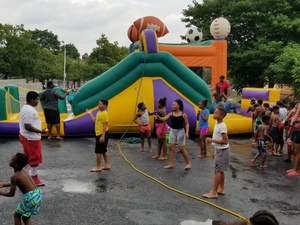Structure and Fun
By Kelly Medinger
10-11-2017
Druid Heights Community Development Corporation uses education grant to support programs for youth in west Baltimore
 A list of rules sits on every table in Druid Heights Community Development Corporation, where a group of approximately 20 young people are gathered afterschool. “Be respectful to everyone,” and “don’t destroy things” are two points on the list. “The kids came up with these rules themselves,” explains Anthony Pressley, Executive Director, “so they’re worded the way they would talk.”
A list of rules sits on every table in Druid Heights Community Development Corporation, where a group of approximately 20 young people are gathered afterschool. “Be respectful to everyone,” and “don’t destroy things” are two points on the list. “The kids came up with these rules themselves,” explains Anthony Pressley, Executive Director, “so they’re worded the way they would talk.”
About Druid Heights CDC
Established in 1974, Druid Heights Community Development Corporation (Druid Heights CDC) seeks to cause, encourage, and promote community self-empowerment in west Baltimore through economic, educational, employment, and affordable housing opportunities.
“We’ve built more than 100 homes as a community developer,” states Pressley. “And this year we helped 28 families transition from renting to owning their own home. Our key to making this community more successful is home ownership,” he adds.
Enriching the lives of young people
In addition to helping house a wide spectrum of people – from seniors to young families – Druid Heights CDC hosts a variety of youth programs, which the Knott Foundation has supported.
A popular program is the summer camp, which is the only free camp in the neighborhood. The mandatory parent orientation for the camp showcases a video about the disparity between a child growing up in the county and one in the city. “The film helps parents buy in to the program – because if what we’re doing at camp isn’t supported at home, then ultimately we won’t get the kids where we want them to be,” reflects Pressley.
This past summer Druid Heights CDC hosted 86 youth and 40 YouthWorks students in its summer camp, with evaluations showing positive results in preventing summer learning loss, the camp’s primary goal.
“In the afterschool program, we have to be more creative,” says Pressley, explaining that parents often take a more relaxed approach to afterschool and allow their kids to do what they want. “We make it fun so the kids want to come back,” he says, “and provide supper so the parents don’t have to worry about it.”
Creating community partnerships
A large part of Druid Heights CDC’s successful programming for youth comes from community partnerships: the Maryland Food Bank (free supper), the Peabody Conservatory (twice weekly harp classes for youth), the Baltimore Policy Department (mentoring), and St. Peter Claver Catholic Church (gym space), to name a few.
Often these partnerships bear witness to the organization’s commitment to building community and breaking down racial barriers. For example, during the grant period, Druid Heights enhanced its cultural enrichment program for youth by forging a relationship with Beth Am Synagogue, bringing together ten African American teens and ten Jewish American teens for two weekends per month for discussions, lunch, and travel.
“We couldn’t do all this without the support of the community,” Pressley concludes. “Our programming and our partnerships really show our direct impact on families and children in our neighborhood.”
